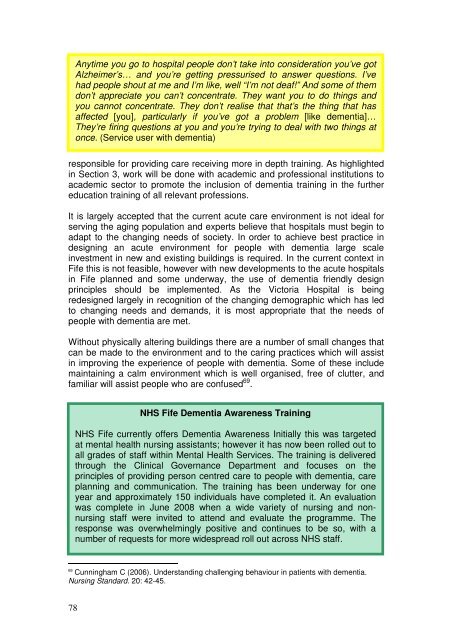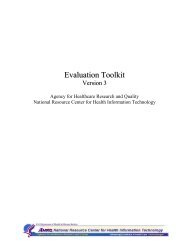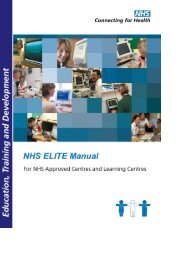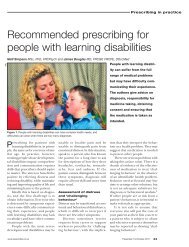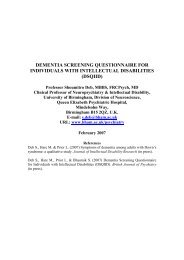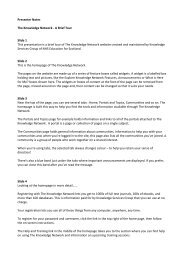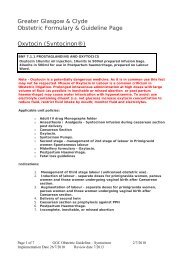The Fife Dementia Strategy: 2010 â 2020 - The Knowledge Network
The Fife Dementia Strategy: 2010 â 2020 - The Knowledge Network
The Fife Dementia Strategy: 2010 â 2020 - The Knowledge Network
You also want an ePaper? Increase the reach of your titles
YUMPU automatically turns print PDFs into web optimized ePapers that Google loves.
Anytime you go to hospital people don’t take into consideration you’ve got<br />
Alzheimer’s… and you’re getting pressurised to answer questions. I’ve<br />
had people shout at me and I’m like, well “I’m not deaf!” And some of them<br />
don’t appreciate you can’t concentrate. <strong>The</strong>y want you to do things and<br />
you cannot concentrate. <strong>The</strong>y don’t realise that that’s the thing that has<br />
affected [you], particularly if you’ve got a problem [like dementia]…<br />
<strong>The</strong>y’re firing questions at you and you’re trying to deal with two things at<br />
once. (Service user with dementia)<br />
responsible for providing care receiving more in depth training. As highlighted<br />
in Section 3, work will be done with academic and professional institutions to<br />
academic sector to promote the inclusion of dementia training in the further<br />
education training of all relevant professions.<br />
It is largely accepted that the current acute care environment is not ideal for<br />
serving the aging population and experts believe that hospitals must begin to<br />
adapt to the changing needs of society. In order to achieve best practice in<br />
designing an acute environment for people with dementia large scale<br />
investment in new and existing buildings is required. In the current context in<br />
<strong>Fife</strong> this is not feasible, however with new developments to the acute hospitals<br />
in <strong>Fife</strong> planned and some underway, the use of dementia friendly design<br />
principles should be implemented. As the Victoria Hospital is being<br />
redesigned largely in recognition of the changing demographic which has led<br />
to changing needs and demands, it is most appropriate that the needs of<br />
people with dementia are met.<br />
Without physically altering buildings there are a number of small changes that<br />
can be made to the environment and to the caring practices which will assist<br />
in improving the experience of people with dementia. Some of these include<br />
maintaining a calm environment which is well organised, free of clutter, and<br />
familiar will assist people who are confused 69 .<br />
NHS <strong>Fife</strong> <strong>Dementia</strong> Awareness Training<br />
NHS <strong>Fife</strong> currently offers <strong>Dementia</strong> Awareness Initially this was targeted<br />
at mental health nursing assistants; however it has now been rolled out to<br />
all grades of staff within Mental Health Services. <strong>The</strong> training is delivered<br />
through the Clinical Governance Department and focuses on the<br />
principles of providing person centred care to people with dementia, care<br />
planning and communication. <strong>The</strong> training has been underway for one<br />
year and approximately 150 individuals have completed it. An evaluation<br />
was complete in June 2008 when a wide variety of nursing and nonnursing<br />
staff were invited to attend and evaluate the programme. <strong>The</strong><br />
response was overwhelmingly positive and continues to be so, with a<br />
number of requests for more widespread roll out across NHS staff.<br />
69<br />
Cunningham C (2006). Understanding challenging behaviour in patients with dementia.<br />
Nursing Standard. 20: 42-45.<br />
78


